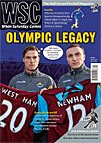 Thirty years ago this month Ipswich thrashed the best team in France. Csaba Abrahall looks back to a memorable UEFA Cup tie
Thirty years ago this month Ipswich thrashed the best team in France. Csaba Abrahall looks back to a memorable UEFA Cup tie
Just the other week, I was listening to Arsenal’s come-from-behind victory against Barcelona at the Emirates. “Remarkable!” said Alan Green. Indeed it was but, as they’d done something very similar last year, somehow not extraordinary. This is how the Champions League has changed European club competition. The group format and perennial participation of the same teams renders a fixture such as Arsenal v Barcelona hardly less routine than Arsenal v Bolton. Notable performances by English clubs in Europe are therefore increasingly common, but so common as to be almost mundane.
In the era of straight knockout tournaments and a broader spread of wealth, talent and opportunity of success, contests between leading clubs were a rarity. Even when winning competitions, victories for English clubs against the most gifted European opposition were unusual enough to be noteworthy. A particularly breathtaking example of such a victory took place 30 years ago this month. As comprehensive as it was unexpected, it had a stunning impact that today’s similar successes lack.
The meeting of St Étienne and Ipswich at the quarter-final stage of the 1980-81 UEFA Cup was a prestigious tie, one between two exciting sides in a tournament that, before it was forced into its shameless attempt to mimic the Champions League lest it be euthanised like the Cup-Winners Cup, was arguably the strongest of the European cups. Bobby Robson’s Ipswich were Division One leaders and seemingly peerless domestically. But they had exhibited vulnerability in Europe, a sequence of away defeats overcome only by a sequence of more substantial home wins. St Étienne, their approach influenced by the exquisite attacking talents of Michel Platini and Johnny Rep, had reached the quarter-final having scored 22 goals and conceded none. After going to Hamburg and winning 5-0 they were now the confident tournament favourites.
Initially, their confidence appeared well founded. Rep’s headed goal on the quarter-hour rewarded a frighteningly powerful start, but Ipswich avoided further damage and equalised when Paul Mariner converted Arnold Mühren’s precise cross. Their assurance then grew to such an extent that they eventually produced what the St Étienne website describes as an “irresistible blue tornado”.
Goals flew past the previously unbeatable Jean Castaneda at regular intervals. Mühren, characteristically influential, scored from 25 yards immediately after half-time. Then Terry Butcher became the unlikely creative force, helping Alan Brazil’s cross into the path of Mariner for the third and laying on John Wark’s 30th goal of the season to complete the historic 4-1 pummelling.
Well, I say “historic”. But I was a young and impressionable Ipswich fan – perhaps my evaluation of this achievement was tainted, perhaps it wasn’t so out of the ordinary, so significant. Yet contemporary reports back me up. The Daily Telegraph hailed Ipswich’s display as “a classic exhibition of attacking soccer [that] enabled them to destroy one of Europe’s most accomplished teams”, one showing “great skill, spirit and maturity”. Robson described it as “tremendous, almost flawless”. In France, too, they were impressed. According to L’Équipe, “this was defeat on all fronts. St Étienne were completely outclassed.” Ipswich were “complete in all aspects of the game”, a view echoed by France Football, who declared them “L’Ajax du temps moderne”.
Praise was not universal, however. The St Étienne website recalls that familiar muddy conditions favoured the English side and stresses that St Étienne were “surpassed physically”. Platini, meanwhile, put it down to the date – St Étienne had suffered a similar defeat against Borussia Mönchengladbach 12 months previously. Two late goals in a 3-1 second-leg win was held up by some as further evidence of Ipswich’s physical superiority, but a 7-2 aggregate success was down to more than brute force. The sophisticated play of Mühren and fellow Dutchman Frans Thijssen made Ipswich genuinely classy and contributed greatly to their success.
They went on to win the competition, but the evening at the Stade Geoffroy-Guichard was the highlight of what was both their finest and most frustrating season. Having appeared appreciably superior to their domestic rivals, they keeled over with exhaustion shortly before the finish line. League runners-up in this and the following season, they then made their way towards the middling second-tier position that has become their regular home.
For St Étienne, too, fortunes declined sharply. Though they won their league title, they have yet to do so again. The following year, Platini departed and financial scandal arrived. Their inherent cool, epitomised by the maverick Rep (“the tousle-haired blond pin-up” according to David Winner in Brilliant Orange) and which inspired Bob Stanley and Pete Wiggs to name a band after them, was destroyed. Ipswich supporters are often accused of talking up the club’s history, but the exceptional brilliance of their performance in St Étienne three decades ago is surely hard to deny. It remains one of the best performances ever by an English club in Europe, and it will take more than an annual Arsenal comeback against Barcelona to convince me otherwise.
From WSC 290 April 2011